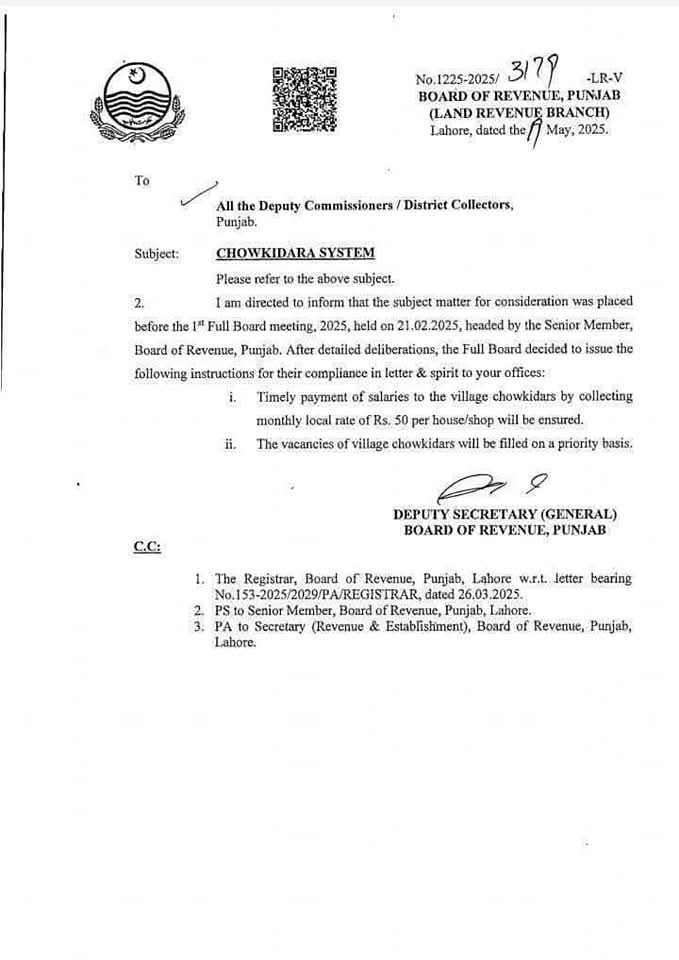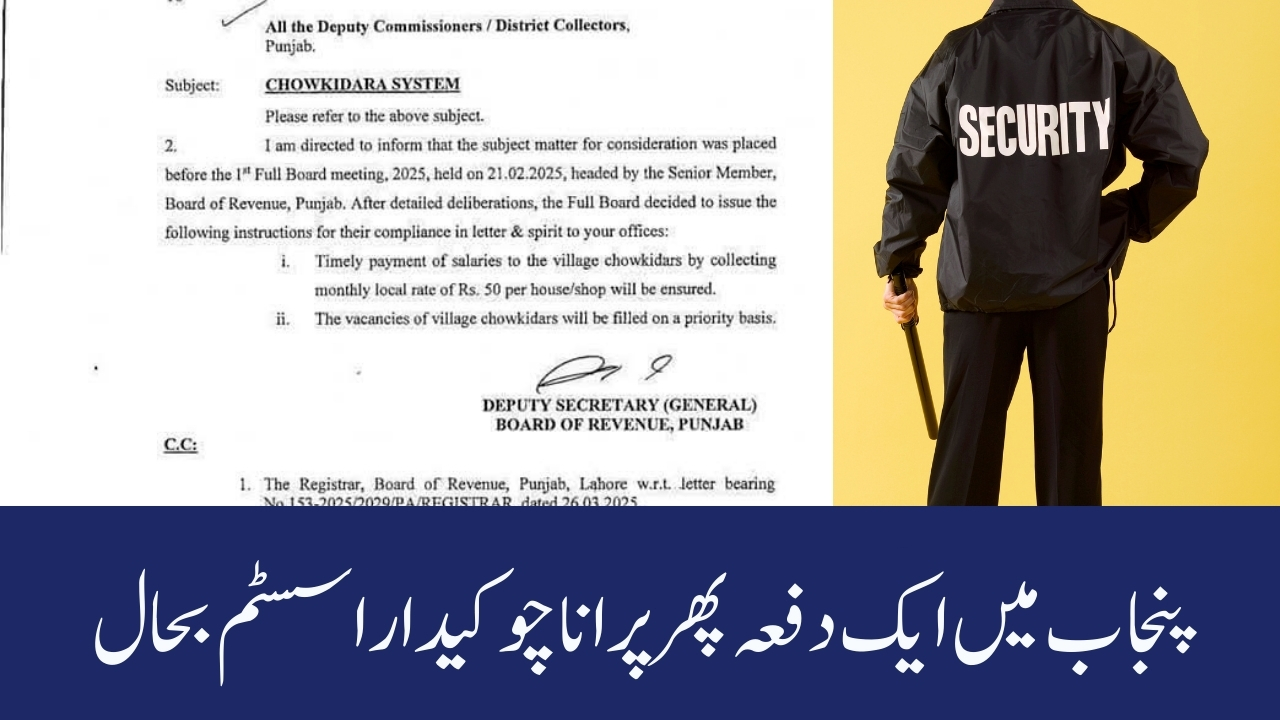Chowkidara System in Punjab: Salary, Hiring, and Instructions Explained
The Chowkidara System in Punjab is an important setup that helps keep villages safe and secure. Chowkidars, also called village watchmen, play a key role in keeping an eye on the area and informing authorities about any problems. To make this system more effective, the Board of Revenue Punjab has issued new guidelines in May 2025. These instructions are for all Deputy Commissioners and District Collectors in Punjab. Check Hotel Eye Portal Online Registration.
A meeting was held on 21st February 2025 under the leadership of the Senior Member of the Board of Revenue, and important decisions were made to improve the chowkidara system in villages. This article explains everything in simple words for better understanding.

What Is the Chowkidara System?
The Chowkidara System is a traditional safety and reporting system in villages. It is made up of village chowkidars who act as local security guards or watchmen. They help maintain law and order, watch over properties, and report any criminal or suspicious activities to the local administration.
These chowkidars are not regular police officers, but they work closely with the government to maintain peace in rural areas. In simple terms, they are the first line of defense in village-level security.
New Instructions by the Board of Revenue, Punjab
In May 2025, the Board of Revenue Punjab issued an official letter to all Deputy Commissioners and District Collectors with two major instructions:
1. Timely Payment of Salaries
The government has decided that village chowkidars will now be paid on time. Their salaries will be collected through a monthly local rate of Rs. 50 per house or shop in the village. This means that every household or shop will pay Rs. 50 per month, and that money will be used to pay the salary of the chowkidar.
This step will ensure that chowkidars get their payment regularly and are motivated to perform their duties responsibly.
2. Priority in Hiring for Vacant Chowkidar Posts
The second decision is that vacant positions of chowkidars in villages must be filled immediately and on priority basis. Many villages have been working without chowkidars, which creates security issues. The government has now made it a priority to fill these vacancies quickly.
These two steps will improve the working of the Chowkidara system and strengthen safety in villages.
Benefits of the Chowkidara System
There are many benefits of improving and strengthening the chowkidara system. Let’s look at some of them:
1. Improved Security in Villages
Chowkidars help protect people and property. They are often the first to respond if any crime happens. With regular presence of chowkidars, villagers feel safe.
2. Quick Reporting of Incidents
Chowkidars are trained to report any crime or unusual activity. This helps the authorities take quick action and stop the problem from becoming bigger.
3. Regular Salary Means Better Work
When chowkidars get paid on time, they will take their job seriously. It also helps them support their families and live a better life.
4. Job Opportunities in Villages
Hiring chowkidars also creates employment opportunities for rural people. It’s a government-supported job that provides regular income.
5. Reduced Burden on Police
Since chowkidars handle minor village matters, the police can focus on bigger crimes. It also helps reduce the pressure on local police stations.
How Will the Salary System Work?
To pay the salary of chowkidars, a simple method has been introduced:
- Every house and shop in the village will pay Rs. 50 per month
- The money will be collected by local authorities
- This fund will be used to pay chowkidars on time
This model is fair and easy. Since the amount is small, it will not be a burden on villagers. But it will make a big difference in the life of chowkidars.
Government’s Focus on Rural Safety
The Board of Revenue, Punjab, is working hard to ensure that all villages have proper safety arrangements. The revival and strengthening of the chowkidara system is part of that effort. By giving timely salaries and filling empty posts quickly, the government wants to make sure that no village is left without a chowkidar.
Frequently Asked Questions (FAQs)
Q1: What is the Chowkidara System?
The Chowkidara System is a setup where village-level watchmen called chowkidars help maintain security and law and order in rural areas.
Q2: Who pays the salary of the chowkidar?
The salary of the chowkidar will be paid by collecting Rs. 50 every month from each house and shop in the village.
Q3: Why is the chowkidar important for the village?
Chowkidars help in keeping villages safe, report crimes, and assist in small law enforcement tasks. They are like the first responders in rural areas.
Q4: What if a village has no chowkidar?
According to the latest instructions, vacant chowkidar posts must be filled immediately. District authorities are responsible for this.
Q5: Is Rs. 50 per house/shop a government tax?
No, it is a local rate collected to support the salary of the chowkidar. It is not a federal or provincial tax.
Q6: Who decided on this new system?
The decision was made in a Board of Revenue meeting held on 21st February 2025 and officially announced in May 2025.
Q7: Will all chowkidars be paid the same amount?
The exact salary is not mentioned in the letter, but it will be paid regularly through the monthly local rate collected from villagers.
Q8: What are the duties of a chowkidar?
A chowkidar watches over the village, reports problems to authorities, keeps an eye on strangers, and helps in emergency situations.
Q9: Can a person apply to become a chowkidar?
Yes. When vacancies are announced, interested persons from the village can apply through the proper government procedure.
Q10: How will this system benefit villagers?
It will improve village safety, create jobs, and ensure proper communication between villages and local government.
Conclusion
The Chowkidara System is being improved for the benefit of villages in Punjab. With new rules for timely salary and filling vacant positions, the government wants to ensure that every village has a working chowkidar who can help keep the area safe. This decision will not only help improve law and order in villages but also provide jobs and make local communities feel secure.
By collecting a small amount from each house and shop, a strong and helpful system can be created without burdening anyone. These steps show the government’s commitment to improving life in rural areas.
Let’s hope this new push brings positive change for chowkidars and for the people of Punjab.






